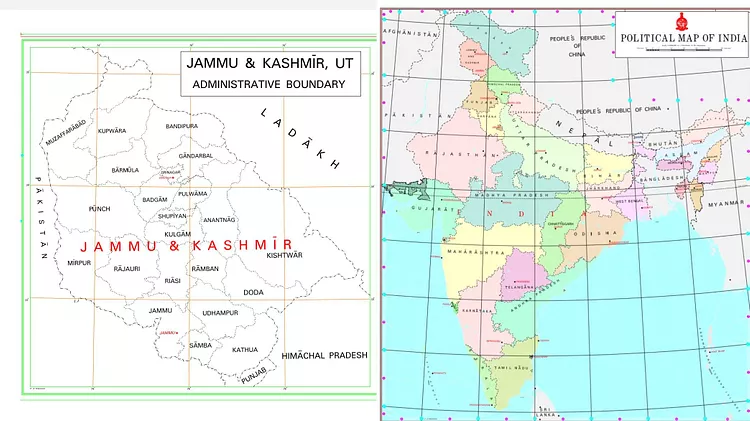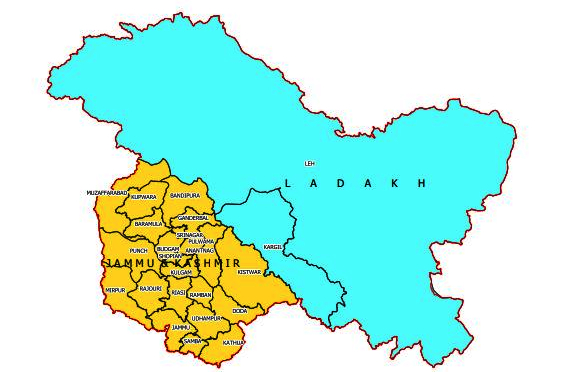On Saturday, the Home Ministry issued a notification detailing the boundaries of the new Union Territories of Jammu and Kashmir, and Ladakh.

The notification also showed a new map of India, which included areas previously labelled as PoK.
Stepping into the record books as the first lieutenant governors of two new union territories, G C Murmu was on Thursday sworn in as lieutenant governor of Jammu and Kashmir and R K Mathur of Ladakh.
The union territories of Jammu and Kashmir, and Ladakh, have been carved out of the state of Jammu and Kashmir, in accordance with the government’s August 5 decision to revoke the special status of the state under Article 370 and bifurcate it into two UTs.
Mathur took the oath of office in Leh and Murmu in Srinagar later in the day.
This means that the Republic of India will now have 28 states and two Union Territories. This is the first time a state has been converted into two Union Territories.
Mathur, a 1977 batch IAS officer from Tripura and a former defence secretary, was sworn in by Jammu and Kashmir High Court Chief Justice Gita Mittal at the Sindhu Sanskriti auditorium in the Ladakh capital.
The function was attended by officials of the Leh and Kargil hill councils, army and paramilitary forces, religious leaders and the general public.
The chief justice then flew to Srinagar to administer the oath of office to 59-year-old Murmu at the Raj Bhawan.
Murmu, an IAS officer of 1985 batch from Gujarat, is probably the first official to be appointed lieutenant governor while he is still in active service. The expenditure secretary was due to retire at the end of the month.
The warrant of appointment of Murmu was read out by Chief Secretary B V R Subrahmanyam. BJP’s Lok Sabha MP Jugal Kishore and Rajya Sabha MP and PDP member Nazir Laway were among the over 250 guests present at the function.
Murmu, who belongs to Odisha, is a postgraduate in political science. He worked closely with Prime Minister Narendra Modi as his additional principal secretary during his tenure as chief minister.
Mathur, who turns 66 next month, said a lot of development activity needs to be carried out in border areas.
“Already, the government is implementing several programmes in the region. The priorities for Ladakh will be set in the new regime in consultation with the public and hill councils,” an official spokesperson quoted him as saying.
He said his experience of working in the backward and border areas in the capacity of the chief secretary of Tripura and the defence secretary will be useful.
While union territory of Jammu and Kashmir will have an elected legislative assembly and council of ministers headed by the chief minister for a period of five years, Ladakh will be directly governed by the Union Home ministry through the lieutenant governor.
Both the union territories will have a common high court.
Ladakh shall come under the ambit of the Union Public Service Commission (UPSC)for the recruitment of officers. Jammu and Kashmir will continue to have the Public Service Commission (PSC) as the recruiting agency for the gazetted services.
Government employees of the new union territories will start getting salaries and other benefits according to the recommendations of the seventh Pay Commission.
This is the first time that a state is being converted into two UTs. The total number of states in the country will now be 28, while the total UTs will go up to nine.
The Constitution of Jammu and Kashmir and the Ranbir Penal Code have ceased to exist from Thursday, when the nation celebrates ‘National Unity Day’ to mark the birth anniversary of the country’s first home minister Sardar Vallabhbhai Patel who is credited with the merger of over 560 states into the Union of India.
EC begins delimitation process
The proposed Delimitation Commission to redraw assembly constituencies in the Union Territory of Jammu and Kashmir will be set up by the central government, and not the Election Commission, the poll panel said on Friday.
Responding to a question at a press conference here, Chief Election Commissioner Sunil Arora said that under the Jammu and Kashmir Reorganisation Act, the Delimitation Commission is to set up by the Ministry of Home Affairs (MHA).
He was addressing the press conference to announce the assembly election schedule in Jharkhand.
Arora said the MHA and the Law Ministry can decide among themselves who would issue the notification for the delimitation exercise.
“Depending on who heads the Delimitation Commission, an appropriate representative of appropriate seniority will be given by the Election Commission,” Arora said.
There have been suggestions that the EC would constitute the delimitation commission.
Two retired EC officials — Shingara Ram and R K Srivastava — have been engaged to help in the delimitation process. Both have contributed in the past delimitation exercise.
“When they (government) are ready, we are ready,” Arora said.
According to section 60 of the Reorganisation Act, “…the number of seats in the Legislative Assembly of Union territory of Jammu and Kashmir shall be increased from 107 to 114….” Out of these 24 seats are in Pakistan-occupied Kashmir. “So effectively, the seats will go up from 83 to 90,” Arora explained.
Delimitation is the process of fixing limits or boundaries of territorial constituencies in a country or a province with a legislative body.
Source: FPJ
Image Courtesy: Jagaran Josh
You may also like
-
Trade Connect E-platform For Exports Is Single Window, Fast, Accessible And Transformational: Shri Piyush Goyal
-
Five Successful Years of Pradhan Mantri Kisan Maandhan Yojana (PM-KMY)
-
Global Study by Leading Experts : Swachh Bharat Mission Drives Significant Reductions in Infant Mortality Rates in India
-
India Graphene Engineering and Innovation Centre (IGEIC) Under the Vision of Viksit Bharat@2047 Launched
-
Government Launches Vishvasya-Blockchain Technology Stack
